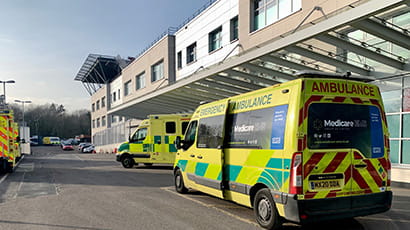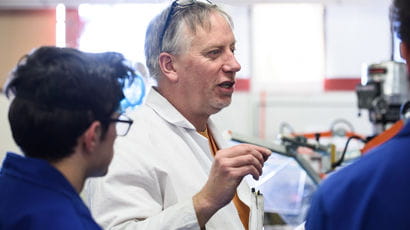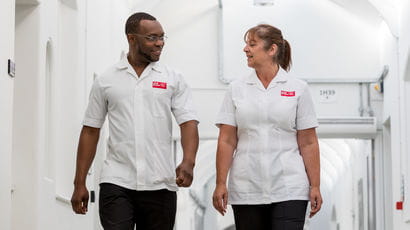UWE Bristol to lead £1.3 million project to evaluate the use of phone app to help with back pain

UWE Bristol will lead a £1.3 million project to evaluate the effectiveness of using an NHS-recommended smart phone app to help people suffering with low back pain.
The new research project – which will see researchers assess the getUBetter app – is one of seven to have received a share of £7.8 million in funding aimed at bringing new technologies into the NHS to benefit patients.
Led by UWE Bristol’s Dr Alice Berry, Associate Professor in Rehabilitation, the project will assess if the musculoskeletal self-management app helps to improve pain and patients’ ability to engage with daily activities, and whether it offers good value for money for the NHS.
Low back pain affects many people in the UK, restricting their daily activities and accounting for five per cent of GP appointments. Many digital tools exist to support people with low back pain to self-manage their symptoms. However, it is not known how they work for patients and healthcare professionals, and whether they provide good care.
The getUBetter app is already used by the NHS to support people with low back pain. Typically, patients are directed to the app by their doctor, GP practice staff or physiotherapist. A simple registration process connects them to guidance and support throughout the recovery journey, providing them with advice about symptoms, information about what to expect, relevant exercises, goal-setting tools, and referral to local treatments and services.
The funding for the project comes from the National Institute for Health and Care Research (NIHR), in collaboration with the Office for Life Sciences and the National Institute for Health and Care Excellence (NICE). Researchers from UWE Bristol, the University of Bristol, and St George’s University Hospital NHS Foundation Trust will work on the project in partnership with the Bristol, North Somerset, South Gloucestershire Integrated Care Board and getUBetter.
The funding aims to help make the UK a leading testbed for late-stage health innovations. It will allow researchers and companies to generate the evidence needed to achieve full NICE guidance, and to accelerate uptake in the NHS so that patients can benefit sooner.
Dr Berry said: “We are very excited to be leading this work and to receive NIHR funding and support from the Office of Life Sciences to broaden understanding of how digital technologies can be utilised by the NHS.”
Related news

12 December 2025
UWE Bristol’s environmentally conscious and student-focused accommodation wins three awards
Purdown View, the world's largest certified Passivhaus student accommodation development, has been recognised at Property Week Student Accommodation Awards.

13 November 2025
Alliance Medical and UWE Bristol launch UK’s first PET-CT postgraduate certificate
In a move set to transform imaging education, Alliance Medical (AML) and UWE Bristol have joined forces to co-design and develop the UK’s first PET-CT Postgraduate Certificate (PG Cert).

10 November 2025
Lessons from Low Traffic Neighbourhoods will drive better public engagement, study finds
Lessons from Low Traffic Neighbourhoods have informed a new toolkit to improve engagement with the public on challenging local street issues.

29 September 2025
Smartphone use hitting struggling pupils hardest, major study finds
Young people struggling with their studies at school are much more likely to have negative experiences on their smartphones than their better performing peers, a major new study has found.

11 September 2025
New study to investigate augmented reality as an intervention for emotionally based school avoidance
A UWE Bristol researcher will support a new study exploring whether an augmented reality board game can help young people with emotionally based school avoidance (EBSA).

28 July 2025
Student wins bronze medal at World Aquatics Championships on her graduation day
UWE Bristol sports rehabilitation student Izzy Thorpe made waves at the World Aquatics Championships winning a bronze medal in artistic swimming on the same day she was meant to be crossing the stage at her university graduation ceremony.

28 May 2025
Leading organisations fighting to end youth violence in cities join UWE Bristol event panel
Leaders from Bristol-based Empire Fighting Chance and Canadian non-profit REACH will speak at the next Bristol Distinguished Address Series.

09 May 2025
UWE Bristol among first universities in UK to introduce sanitary waste bins in male toilets
UWE Bristol is among the first universities in the UK to introduce sanitary waste bins in male toilets for the disposal of incontinence products.

11 April 2025
UWE Bristol academics among emerging scientific leaders to receive share of £7.6m for health research
Two UWE Bristol researchers are among the recipients of a £7.6 million investment from the Academy of Medical Sciences aimed at tackling urgent health challenges.

09 April 2025
New research to support a thriving health and care workforce is launched
A national research partnership will explore ways to support wellbeing and sustainability in the NHS and social care same day and urgent care workforce.

10 March 2025
UWE Bristol to explore the power of open water swimming at upcoming event with The Wave founder Nick Hounsfield
An inspiring tale of grit and resilience will be told to audiences at the first BDAS event of 2025 as UWE Bristol welcomes Nick Hounsfield, founder of The Wave.

28 February 2025
Paramedics in GP surgeries may ease workload but not NHS costs, study finds
Paramedics working in GP surgeries help reduce GP workload but do not contribute to cost savings to the NHS, according to the first major study of the clinical and cost-effectiveness of paramedic compared with GP consultations.
You may also be interested in

Media enquiries
Enquiries related to news releases and press and contacts for the media team.

Find an expert
Media contacts are invited to check out the vast range of subjects where UWE Bristol can offer up expert commentary.

School of Health and Social Wellbeing
The School of Health and Social Wellbeing is home to all our courses and research related to this varied and rewarding sector.

We're creating tomorrow, today. RISE
Collaborating with industry, public sector bodies and communities, we’re redefining horizons and challenging conventions to impact lives positively.






